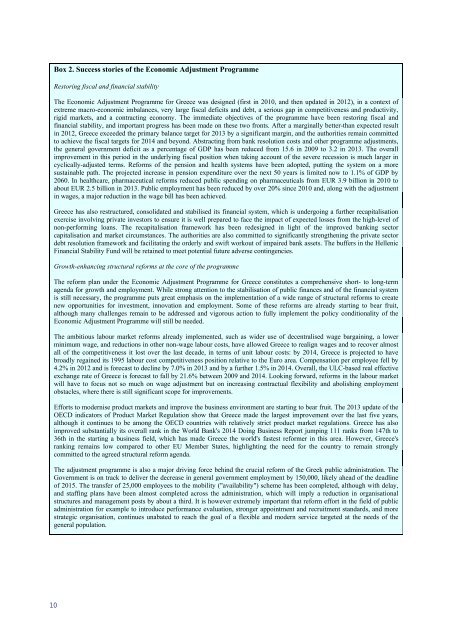ocp192_en
ocp192_en
ocp192_en
You also want an ePaper? Increase the reach of your titles
YUMPU automatically turns print PDFs into web optimized ePapers that Google loves.
Box 2. Success stories of the Economic Adjustm<strong>en</strong>t ProgrammeRestoring fiscal and financial stabilityThe Economic Adjustm<strong>en</strong>t Programme for Greece was designed (first in 2010, and th<strong>en</strong> updated in 2012), in a context ofextreme macro-economic imbalances, very large fiscal deficits and debt, a serious gap in competitiv<strong>en</strong>ess and productivity,rigid markets, and a contracting economy. The immediate objectives of the programme have be<strong>en</strong> restoring fiscal andfinancial stability, and important progress has be<strong>en</strong> made on these two fronts. After a marginally better-than expected resultin 2012, Greece exceeded the primary balance target for 2013 by a significant margin, and the authorities remain committedto achieve the fiscal targets for 2014 and beyond. Abstracting from bank resolution costs and other programme adjustm<strong>en</strong>ts,the g<strong>en</strong>eral governm<strong>en</strong>t deficit as a perc<strong>en</strong>tage of GDP has be<strong>en</strong> reduced from 15.6 in 2009 to 3.2 in 2013. The overallimprovem<strong>en</strong>t in this period in the underlying fiscal position wh<strong>en</strong> taking account of the severe recession is much larger incyclically-adjusted terms. Reforms of the p<strong>en</strong>sion and health systems have be<strong>en</strong> adopted, putting the system on a moresustainable path. The projected increase in p<strong>en</strong>sion exp<strong>en</strong>diture over the next 50 years is limited now to 1.1% of GDP by2060. In healthcare, pharmaceutical reforms reduced public sp<strong>en</strong>ding on pharmaceuticals from EUR 3.9 billion in 2010 toabout EUR 2.5 billion in 2013. Public employm<strong>en</strong>t has be<strong>en</strong> reduced by over 20% since 2010 and, along with the adjustm<strong>en</strong>tin wages, a major reduction in the wage bill has be<strong>en</strong> achieved.Greece has also restructured, consolidated and stabilised its financial system, which is undergoing a further recapitalisationexercise involving private investors to <strong>en</strong>sure it is well prepared to face the impact of expected losses from the high-level ofnon-performing loans. The recapitalisation framework has be<strong>en</strong> redesigned in light of the improved banking sectorcapitalisation and market circumstances. The authorities are also committed to significantly str<strong>en</strong>gth<strong>en</strong>ing the private sectordebt resolution framework and facilitating the orderly and swift workout of impaired bank assets. The buffers in the Hell<strong>en</strong>icFinancial Stability Fund will be retained to meet pot<strong>en</strong>tial future adverse conting<strong>en</strong>cies.Growth-<strong>en</strong>hancing structural reforms at the core of the programmeThe reform plan under the Economic Adjustm<strong>en</strong>t Programme for Greece constitutes a compreh<strong>en</strong>sive short- to long-termag<strong>en</strong>da for growth and employm<strong>en</strong>t. While strong att<strong>en</strong>tion to the stabilisation of public finances and of the financial systemis still necessary, the programme puts great emphasis on the implem<strong>en</strong>tation of a wide range of structural reforms to creat<strong>en</strong>ew opportunities for investm<strong>en</strong>t, innovation and employm<strong>en</strong>t. Some of these reforms are already starting to bear fruit,although many chall<strong>en</strong>ges remain to be addressed and vigorous action to fully implem<strong>en</strong>t the policy conditionality of theEconomic Adjustm<strong>en</strong>t Programme will still be needed.The ambitious labour market reforms already implem<strong>en</strong>ted, such as wider use of dec<strong>en</strong>tralised wage bargaining, a lowerminimum wage, and reductions in other non-wage labour costs, have allowed Greece to realign wages and to recover almostall of the competitiv<strong>en</strong>ess it lost over the last decade, in terms of unit labour costs: by 2014, Greece is projected to havebroadly regained its 1995 labour cost competitiv<strong>en</strong>ess position relative to the Euro area. Comp<strong>en</strong>sation per employee fell by4.2% in 2012 and is forecast to decline by 7.0% in 2013 and by a further 1.5% in 2014. Overall, the ULC-based real effectiveexchange rate of Greece is forecast to fall by 21.6% betwe<strong>en</strong> 2009 and 2014. Looking forward, reforms in the labour marketwill have to focus not so much on wage adjustm<strong>en</strong>t but on increasing contractual flexibility and abolishing employm<strong>en</strong>tobstacles, where there is still significant scope for improvem<strong>en</strong>ts.Efforts to modernise product markets and improve the business <strong>en</strong>vironm<strong>en</strong>t are starting to bear fruit. The 2013 update of theOECD indicators of Product Market Regulation show that Greece made the largest improvem<strong>en</strong>t over the last five years,although it continues to be among the OECD countries with relatively strict product market regulations. Greece has alsoimproved substantially its overall rank in the World Bank's 2014 Doing Business Report jumping 111 ranks from 147th to36th in the starting a business field, which has made Greece the world's fastest reformer in this area. However, Greece'sranking remains low compared to other EU Member States, highlighting the need for the country to remain stronglycommitted to the agreed structural reform ag<strong>en</strong>da.The adjustm<strong>en</strong>t programme is also a major driving force behind the crucial reform of the Greek public administration. TheGovernm<strong>en</strong>t is on track to deliver the decrease in g<strong>en</strong>eral governm<strong>en</strong>t employm<strong>en</strong>t by 150,000, likely ahead of the deadlineof 2015. The transfer of 25,000 employees to the mobility ("availability") scheme has be<strong>en</strong> completed, although with delay,and staffing plans have be<strong>en</strong> almost completed across the administration, which will imply a reduction in organisationalstructures and managem<strong>en</strong>t posts by about a third. It is however extremely important that reform effort in the field of publicadministration for example to introduce performance evaluation, stronger appointm<strong>en</strong>t and recruitm<strong>en</strong>t standards, and morestrategic organisation, continues unabated to reach the goal of a flexible and modern service targeted at the needs of theg<strong>en</strong>eral population.10


